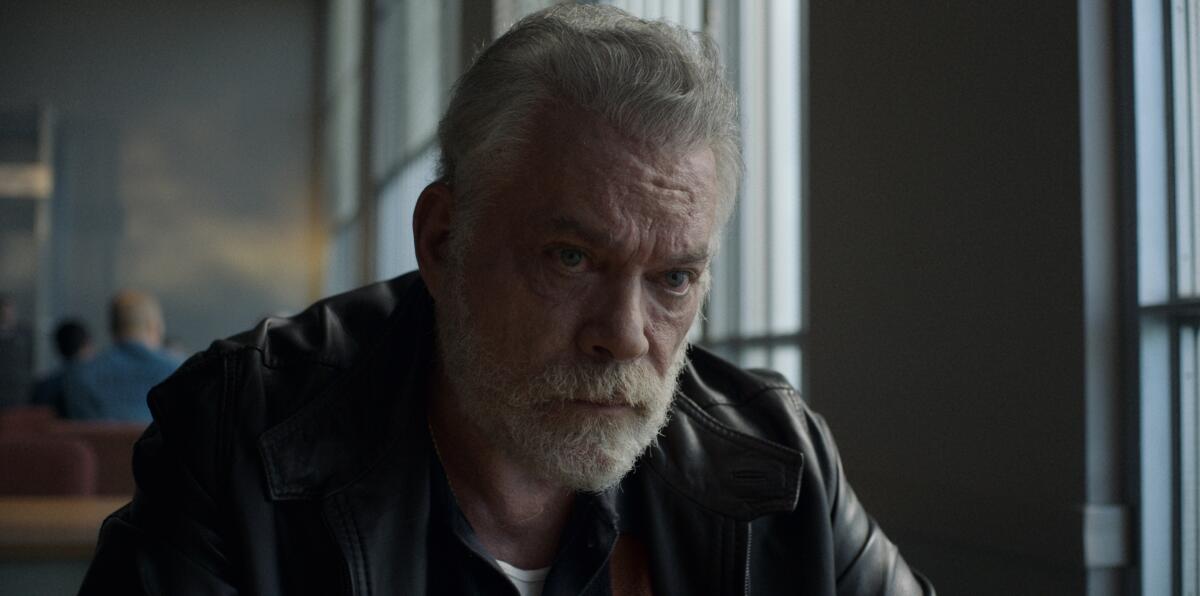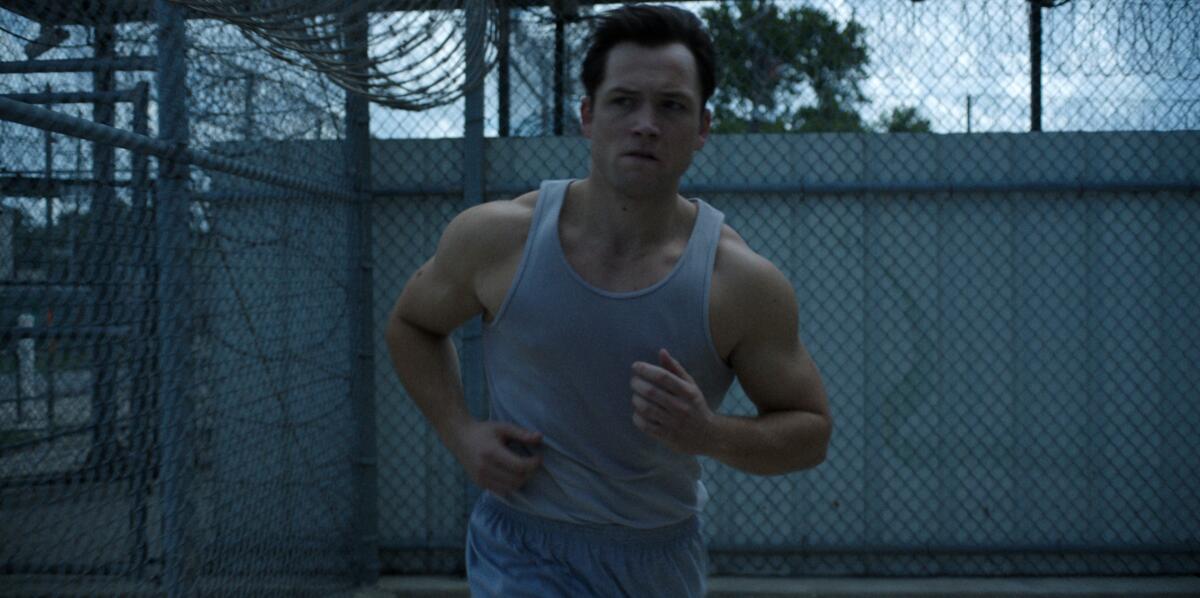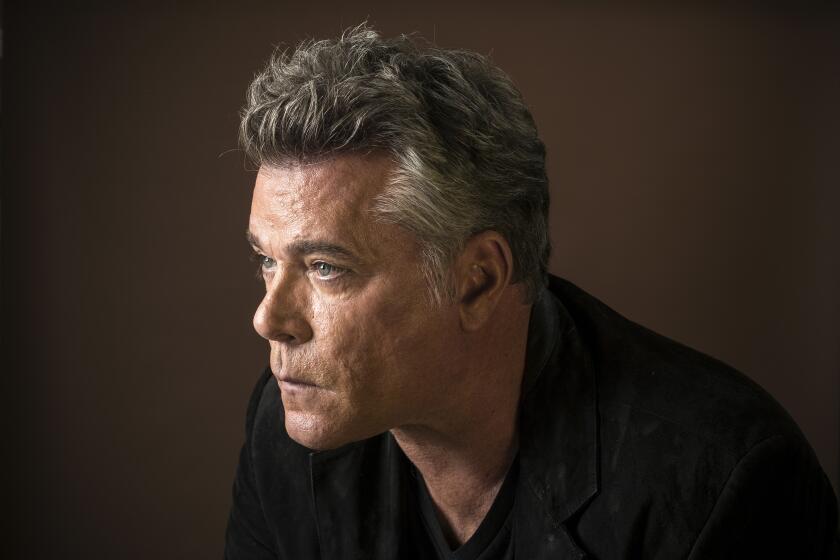The late Ray Liotta is perfectly cast in ‘Black Bird,’ his final TV performance

- Share via
Every episode of “Black Bird,” premiering Friday on Apple TV+, begins with the legend, “The following is inspired by a true story.”
Now, television shows inspired by true stories are a dime a dozen these days; the cachet attached to something that “really happened,” if not exactly as represented by often very famous actors speaking invented dialogue, can be a valuable promotional tool. Audiences respond. Ergo the “true” in “true crime.”
In this case, however, the notice feels almost necessary, given that the story seems a little nutty even once you’ve done enough research to verify the basic facts. I have not read “In With the Devil,” the book on which the series is based, but I have watched a CNN documentary and a “Dateline” episode on the subject. And while there has evidently been some arrangement of events and sculpting of characters for purposes of dramatic emphasis, the strange basics are true enough: Back in the 1990s, Jimmy Keene (Taron Egerton, musclebound and unrecognizable as the actor who was Elton John in “Rocketman”), serving a sentence for drug dealing, did go undercover in a prison for the criminally insane in an attempt to elicit incriminating information from suspected serial killer and convicted kidnapper Larry Hall (Paul Walter Hauser), with the promise that success would lead to his freedom.
The actor, who died overnight at 67, found nuance within his signature brooding menace, bringing charm, tenderness and grace to many roles.
That the series begins with narration from Keene, about the butterfly effect which will tie his life to that of a young girl seen riding a bicycle through a cornfield, plays almost as an homage to “Goodfellas,” whose star, the late Ray Liotta, plays Keene’s beloved if problematic father — a former, perhaps slightly bent policeman. (Narration fitfully returns through the series, including one character speaking from beyond the grave.) Jimmy the younger, we are soon to learn, affords his luxe Chicago apartment and fancy sports car and closet full of expensive clothes by dealing cocaine; we also learn that he was a high school football star, and that on some level he is a decent guy, who brings the gift of a pillow to a drug connection who had complained of neck pain and puts himself on the line to protect an old friend who has cheated him. He’s also cocky and smug, with “an ego that announces itself half an hour before it enters the … room.” But we don’t completely hate him — he’s charming, as we’re told repeatedly — and the character needs somewhere to go. This is a tale of redemption.
Arrested and sentenced to 10 years, while expecting less, Keene is after several months approached by Edmund Beaumont (Robert Wisdom), the prosecutor who put him away, with the aforementioned proposition: Transfer to another prison, get close to Hall, get him to say where the bodies are buried and go free. The authorities are concerned that Hall, whose appeal has been granted, may be released from prison and kill again, inserting a ticking clock into the story. (They are apparently unconcerned with what Keene may get up to once he’s out.) There is some hemming and hawing on Keene’s part and semiantagonistic flirty banter with federal agent Lauren McCauley (Sepideh Moafi), who squeezes a lot of expository background out of him — looking for the sliver of misogyny that Keene might use to connect with Hall.

Having passed McCauley’s “audition,” Keene then finds himself in the benignly named United States Medical Facility for Federal Prisoners in Springfield, Mo., whose population his father describes as “freaks with no souls … lifers with nothing to lose.” One may reasonably wonder, as small-town lawman Brian Miller (Greg Kinnear) will ask McCauley, why an actual, experienced undercover agent isn’t being used; “Hall would smell him out,” she replies. This still seems goofy to me, but it’s what happened.
Developed by Dennis Lehane, who wrote the novels “Mystic River,” “Shutter Island” and “Gone Baby Gone” and was a writer on the Stephen King-based serial killer series, “Mr. Mercedes,” it is expertly acted, smartly scripted and intelligently rendered in nearly all its parts, though these parts are arranged in sometimes confusing order, switching between time periods and between Keene’s journey and the murder and missing persons investigations pursued by Kinnear’s straight-arrow detective, an oasis of normalcy in the moral muck and mire. (McCauley appears in both storylines, and her affect in each is different enough that you may wonder at first whether you are not watching two different, if physically similar, characters.) Even with streamlining, it may take some mental squinting to keep Hall’s legal situation and the old and new investigations in focus.
There are digressions as well, including a rather moving sequence recounting a victim’s life and compare-and-contrast flashbacks to the childhoods of Keene and Hall. In prison, there are Keene’s encounters with a real-life mob boss and a manipulative guard to add tension, and just enough mayhem to remind you that this is no ordinary hoosegow. Liotta’s scenes too can feel extended beyond what’s necessary just for the sake of keeping him onscreen a little longer, a worthy enough proposition that brings the additional benefit of Robyn Malcolm as his second wife, Sammy, a wry performance in a show somewhat short on wryness. These passages, unassailable on their own merits, do give “Black Bird” a patchwork feeling and contribute to the sense, so familiar nowadays, that pacing is secondary to filling time. (At the same time, kudos to the producers for not making the series longer. Six episodes in an eight-to-10-episode world still counts as modest.)
Critic Robert Lloyd could use a break from TV shows inspired by Stephen King. But not before ranking the nine he’s reviewed from best to worst.
As Hall, wearing thick mutton chops grown for Civil War reenactments, Hauser performs as if in a dream — more in the prison scenes, where he is drugged — speaking in a breathy, high-pitched voice that underlines his weakness of character. (Hauser has said that he has modeled his delivery on Hall’s own speech, but it doesn’t really reflect the snippets I’ve heard; it’s an actor’s concept, fundamentally.) Keene’s stratagems to get close to him, ironically, make Hall more sympathetic, given that Keene is a false friend he takes for a real one, just another insult in a life of injury that began in the womb: His protective twin brother, Gary (Jake McLaughlin), took more than his share of nutrition.
There is some room provided to wonder whether Hall is actually guilty — policemen less dogged than Miller have written him off as a “harmless weirdo,” a “serial confessor” to crimes he didn’t commit — but one never actually doubts it. Serial killers, for all their cultural popularity, are dramatically limited; they have a single motivation and nowhere to go as characters. But Lehane and Hauser get a surprising lot out of Hall, with speeches that, while not marking him out to be an evil genius, are not devoid of insight or even poetry. Enough of them are also disgusting, which is the axis on which Keene will turn from a person who cares mostly about himself into a man with a conscience.
Beyond the remarkable subject matter, Liotta’s presence — in the first of his posthumous screen appearances — is what makes the series more than usually noteworthy. He’s an old lion playing an old lion, still trying to do right by his son and somehow failing and spending much of the series diminished by health problems — a shadow even of the self we meet in his opening scenes, and certainly in Keene’s memory. Above all there is that singular, inborn mix of the rough and the sweet, a softness to his voice, his eyes, that from “Something Wild” on has provided a sort of complicating countermelody to the darker aspects of his less savory roles. (It’s hard to imagine “Goodfellas” being watchable without him.) That 30 years ago he could have played the son makes him perfect casting for the father.
'Black Bird'
Where: Apple TV+
When: Anytime
Rated: TV-MA (may be unsuitable for children under age 17)
More to Read
The complete guide to home viewing
Get Screen Gab for everything about the TV shows and streaming movies everyone’s talking about.
You may occasionally receive promotional content from the Los Angeles Times.








